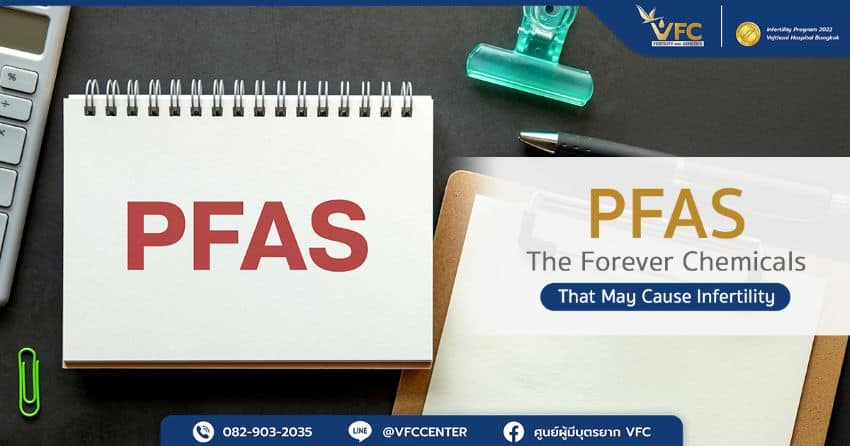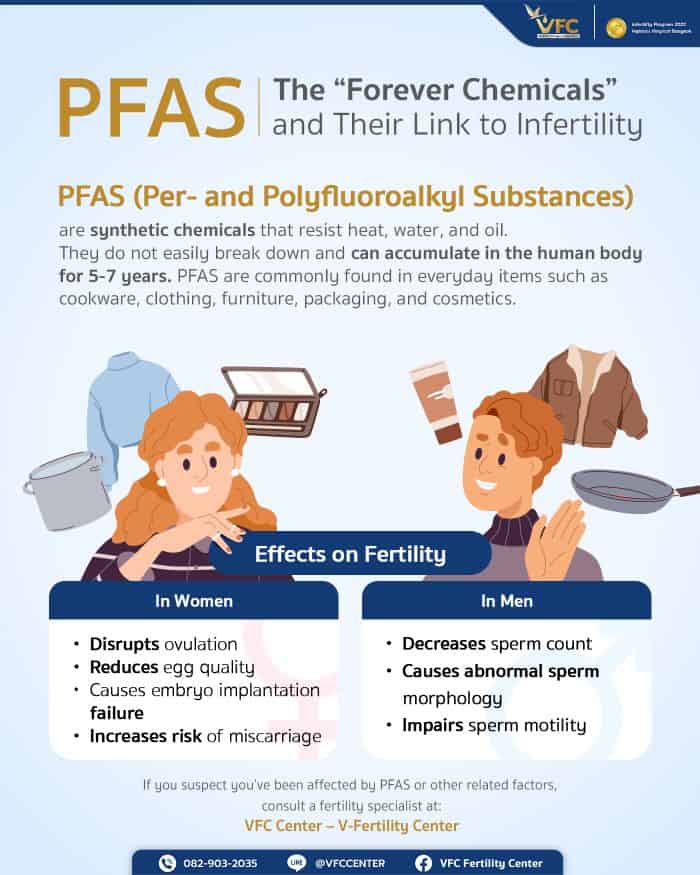
PFAS, known as “forever chemicals” are synthetic toxins found in everyday products such as cookware, clothing, packaging, and even drinking water. These chemicals can stay in the body for years and disrupt hormones that control reproductive health. Research shows that long-term PFAS exposure may affect ovulation, egg quality, embryo development, and sperm health, increasing the risk of infertility for both women and men. Understanding where PFAS come from, how they impact the body, and how to reduce exposure can help protect fertility and improve your chances of conceiving naturally or through medical treatment.
Let’s take a closer look at what PFAS are, where they come from, how they affect your health, especially their link to infertility, and what you can do to protect yourself from these hormone–disrupting chemicals. By understanding and taking preventive steps, you can proactively care for your health and improve your chances of conception.
Schedule a consultation and fertility assessment with VFC today.

What Is PFAS ?
PFAS, or Per- and Polyfluoroalkyl Substances, are synthetic chemicals known for their resistance to heat, water, and oil. Because of these durable properties, PFAS have been widely used across various industries since the 1940s and have unknowingly become part of our daily lives.
Due to their persistence and inability to break down easily, PFAS are often called “forever chemicals.” They can remain in the environment and the human body for many years, with some types accumulating in the blood, liver, and kidneys for as long as 5-7 years.
Common Sources of PFAS in Everyday Life
PFAS can enter our lives through many everyday products and materials we use without realizing it. Examples include:
- Cookware: Nonstick coatings such as Teflon, commonly used in household pans, can release PFAS into food when exposed to high heat.
- Clothing and Furniture: Water-resistant clothing, carpets, and sofas often contain PFAS-based coatings to prevent moisture and stains.
- Food Packaging: Items like pizza boxes, microwave popcorn bags, and disposable food containers are often coated with PFAS to resist grease and oil.
- Cosmetics: Certain waterproof cosmetics — such as foundations and mascaras — may contain PFAS to improve durability.
- Drinking Water: Both natural water sources and municipal supplies can become contaminated with PFAS, posing a potential health risk.
Health Effects of PFAS
PFAS are classified as hormone-disrupting chemicals (Endocrine Disrupting Chemicals – EDCs) that can interfere with normal hormonal function and affect overall health in several ways:
Disruption of Thyroid Function
The thyroid gland plays a crucial role in regulating metabolism and growth. Exposure to PFAS can interfere with thyroid hormone production, leading to imbalances that affect both general health and reproductive function.
Impact on the Immune System
High levels of PFAS exposure can weaken the immune system, making the body more vulnerable to infections and illnesses. In children, PFAS exposure has been linked to reduced vaccine effectiveness.
Increased Risk of Certain Cancers
Long-term exposure to PFAS has been associated with a higher risk of developing certain cancers, such as kidney and testicular cancer, due to its impact on cellular and hormonal regulation.
Effects on Fetal and Infant Development
PFAS can transfer from mother to child through the placenta and breast milk, exposing infants from an early age. This can interfere with the development of key systems in the body, including the nervous, immune, and endocrine systems.
PFAS and Infertility
PFAS can disrupt the body’s hormonal balance, especially sex hormones, which play a key role in reproductive health. This disruption affects both women and men in different ways, as outlined below.
Effects on Female Fertility
Disruption of Ovulation
PFAS interfere with female sex hormones such as estrogen and progesterone, which regulate the ovulation cycle. When these hormones are disrupted, menstrual cycles can become irregular, and ovulation may not occur normally, leading to infertility.
Reduced Egg Quality
Long-term exposure to PFAS may directly affect egg quality, reducing the chances of successful fertilization. Even when fertilization occurs, it can negatively impact early embryo development.
Embryo Implantation Failure
These “forever chemicals” can hinder the development of the uterine lining, making it less receptive for embryo implantation. This may result in implantation failure or an increased risk of early miscarriage.
Effects on Male Fertility
Decreased Sperm Quality
Exposure to PFAS has been linked to a lower sperm count, abnormal sperm morphology, and reduced motility — all of which are key factors that decrease the likelihood of conception.
Schedule a consultation and fertility assessment with VFC today.

How to Prevent and Reduce PFAS Exposure
Although PFAS are commonly found in many products, you can lower your risk of exposure by making small changes in your daily habits. Here are some simple ways to protect yourself:
Choose Safe Cookware
Replace nonstick pans with alternatives such as cast iron, stainless steel, or ceramic cookware, which do not release PFAS when heated.
Avoid Grease-Resistant Food Packaging
Reduce your use of grease-proof packaging like pizza boxes and microwave popcorn bags. Opt for glass or BPA-free plastic containers when reheating food.
Read Product Labels
When buying clothing or furniture, always check the product label and avoid items advertised as water- or stain-resistant, as these often contain PFAS.
Install a Water Filtration System
Consider using a certified water filter, such as a Reverse Osmosis or Activated Carbon system, which can effectively reduce PFAS contamination in drinking water.
For couples trying to conceive, avoiding PFAS exposure is crucial to protecting fertility health. If you suspect infertility related to long-term PFAS exposure or other factors, VFC Center (V-Fertility Center) offers comprehensive fertility diagnostics, an infertility check in Bangkok, and personalized medical consultations to identify the cause and provide safe, effective treatment options.
Frequently Asked Questions (FAQs)
Q: Are PFAS in nonstick cookware really dangerous ?
A: Nonstick cookware coated with Teflon, which contains PFAS, can release harmful chemicals when exposed to high heat or when the coating begins to peel. These chemicals can contaminate food and enter the body. Avoiding PFAS-coated cookware is the safest option.
Q: How can I know if PFAS has accumulated in my body ?
A: PFAS levels can be detected through blood testing in a specialized laboratory. However, such tests are not commonly available and can be costly. The most practical approach is to minimize exposure by avoiding PFAS-containing products in daily life.
Q: How does PFAS affect men’s health ?
A: PFAS exposure can directly impact male fertility. Long-term accumulation of PFAS in the body has been linked to lower sperm count, abnormal sperm morphology, and reduced sperm motility — all of which significantly decrease the chances of conception.
Article by Dr. Sorramon Songveeratham
Contact or Book a Consultation:
VFC Center – V-Fertility Center
Hotline: 082-903-2035
LINE Official: @vfccenter

OBSTETRICS AND GYNAECOLOGY-REPRODUCTIVE MEDICINE





No Comments
Sorry, the comment form is closed at this time.